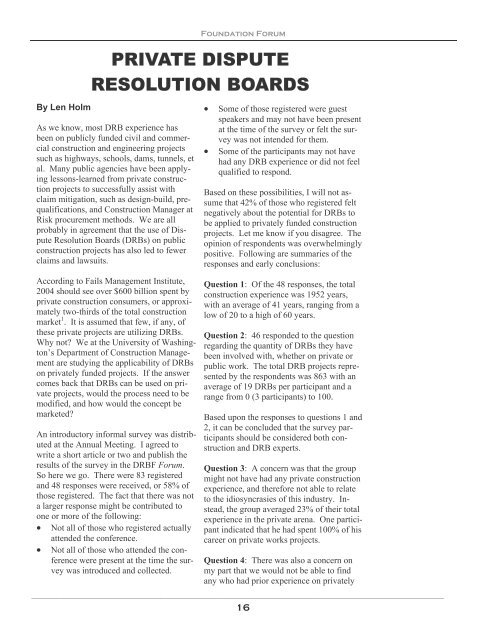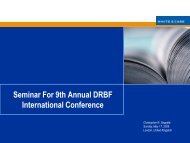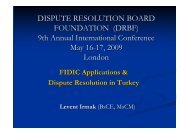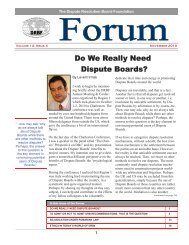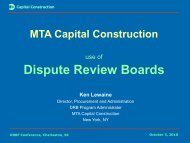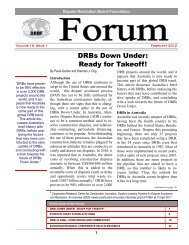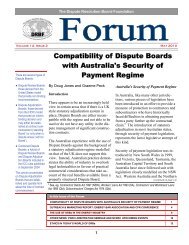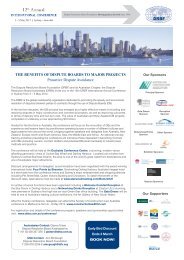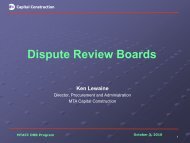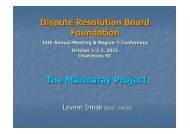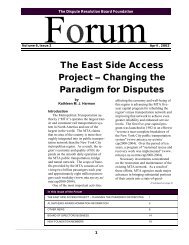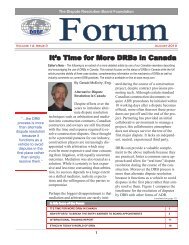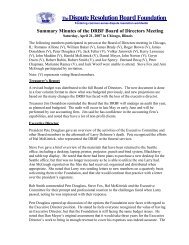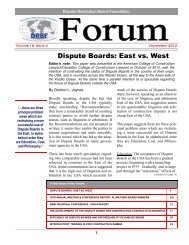DRBF NAMES EXECUTIVE DIRECTOR - Dispute Resolution Board Foundation
DRBF NAMES EXECUTIVE DIRECTOR - Dispute Resolution Board Foundation
DRBF NAMES EXECUTIVE DIRECTOR - Dispute Resolution Board Foundation
You also want an ePaper? Increase the reach of your titles
YUMPU automatically turns print PDFs into web optimized ePapers that Google loves.
<strong>Foundation</strong> Forum<br />
PRIVATE DISPUTE<br />
RESOLUTION BOARDS<br />
By Len Holm<br />
As we know, most DRB experience has<br />
been on publicly funded civil and commercial<br />
construction and engineering projects<br />
such as highways, schools, dams, tunnels, et<br />
al. Many public agencies have been applying<br />
lessons-learned from private construction<br />
projects to successfully assist with<br />
claim mitigation, such as design-build, prequalifications,<br />
and Construction Manager at<br />
Risk procurement methods. We are all<br />
probably in agreement that the use of <strong>Dispute</strong><br />
<strong>Resolution</strong> <strong>Board</strong>s (DRBs) on public<br />
construction projects has also led to fewer<br />
claims and lawsuits.<br />
According to Fails Management Institute,<br />
2004 should see over $600 billion spent by<br />
private construction consumers, or approximately<br />
two-thirds of the total construction<br />
market 1 . It is assumed that few, if any, of<br />
these private projects are utilizing DRBs.<br />
Why not? We at the University of Washington’s<br />
Department of Construction Management<br />
are studying the applicability of DRBs<br />
on privately funded projects. If the answer<br />
comes back that DRBs can be used on private<br />
projects, would the process need to be<br />
modified, and how would the concept be<br />
marketed?<br />
An introductory informal survey was distributed<br />
at the Annual Meeting. I agreed to<br />
write a short article or two and publish the<br />
results of the survey in the <strong>DRBF</strong> Forum.<br />
So here we go. There were 83 registered<br />
and 48 responses were received, or 58% of<br />
those registered. The fact that there was not<br />
a larger response might be contributed to<br />
one or more of the following:<br />
• Not all of those who registered actually<br />
attended the conference.<br />
• Not all of those who attended the conference<br />
were present at the time the survey<br />
was introduced and collected.<br />
• Some of those registered were guest<br />
speakers and may not have been present<br />
at the time of the survey or felt the survey<br />
was not intended for them.<br />
• Some of the participants may not have<br />
had any DRB experience or did not feel<br />
qualified to respond.<br />
Based on these possibilities, I will not assume<br />
that 42% of those who registered felt<br />
negatively about the potential for DRBs to<br />
be applied to privately funded construction<br />
projects. Let me know if you disagree. The<br />
opinion of respondents was overwhelmingly<br />
positive. Following are summaries of the<br />
responses and early conclusions:<br />
Question 1: Of the 48 responses, the total<br />
construction experience was 1952 years,<br />
with an average of 41 years, ranging from a<br />
low of 20 to a high of 60 years.<br />
Question 2: 46 responded to the question<br />
regarding the quantity of DRBs they have<br />
been involved with, whether on private or<br />
public work. The total DRB projects represented<br />
by the respondents was 863 with an<br />
average of 19 DRBs per participant and a<br />
range from 0 (3 participants) to 100.<br />
Based upon the responses to questions 1 and<br />
2, it can be concluded that the survey participants<br />
should be considered both construction<br />
and DRB experts.<br />
Question 3: A concern was that the group<br />
might not have had any private construction<br />
experience, and therefore not able to relate<br />
to the idiosyncrasies of this industry. Instead,<br />
the group averaged 23% of their total<br />
experience in the private arena. One participant<br />
indicated that he had spent 100% of his<br />
career on private works projects.<br />
Question 4: There was also a concern on<br />
my part that we would not be able to find<br />
any who had prior experience on privately<br />
———————————————————————————————————————————————————<br />
16


